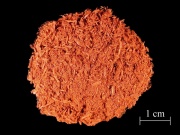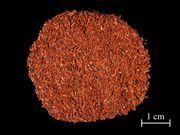Difference between revisions of "Barwood"
Jump to navigation
Jump to search
(username removed) |
|||
| (3 intermediate revisions by 3 users not shown) | |||
| Line 1: | Line 1: | ||
[[File:image9_camwood.jpg|thumb|Cut piece of camwood]] | [[File:image9_camwood.jpg|thumb|Cut piece of camwood]] | ||
== Description == | == Description == | ||
| + | [[File:camwood_1.jpg|thumb|Ground pieces of camwood]] | ||
| + | A reddish hardwood obtained from the genus Ptercarpus (e.g., ''Baphia nitida'') trees in Sierra Leone (barwood) and the west coast of Africa (camwood). Barwood trees produce a fugitive red dyestuff containing [[santalin]] that has been used for textiles and tanning [[leather]]. The dye is soluble in alcohol, but insoluble and water. It was used commercially to produce mock [[turkey red]] dyes. | ||
| − | + | See also [[sandalwood]] | |
| − | + | [[File:barwood.jpg|thumb|Ground pieces of barwood]] | |
| − | |||
== Synonyms and Related Terms == | == Synonyms and Related Terms == | ||
sanderswood; red sandalwood; ruby wood; sandalo rosso (It.) | sanderswood; red sandalwood; ruby wood; sandalo rosso (It.) | ||
| − | == | + | ==Physical and Chemical Properties== |
Soluble in alcohol, acids and alkalis. | Soluble in alcohol, acids and alkalis. | ||
| Line 17: | Line 18: | ||
Insoluble in water. | Insoluble in water. | ||
| − | == | + | ==Resources and Citations== |
| − | |||
| − | |||
| − | |||
| − | |||
| − | |||
| − | |||
| − | |||
| − | * | + | * G.S.Brady, ''Materials Handbook'', McGraw-Hill Book Co., New York, 1971 Comment: p. 136 |
| − | * | + | * Ralph Mayer, ''A Dictionary of Art Terms and Techniques'', Harper and Row Publishers, New York, 1969 (also 1945 printing) |
* Art and Architecture Thesaurus Online, http://www.getty.edu/research/tools/vocabulary/aat/, J. Paul Getty Trust, Los Angeles, 2000 | * Art and Architecture Thesaurus Online, http://www.getty.edu/research/tools/vocabulary/aat/, J. Paul Getty Trust, Los Angeles, 2000 | ||
| − | * | + | * F. Crace-Calvert, ''Dyeing and Calico Printing'', Palmer & Howe, London, 1876 |
[[Category:Materials database]] | [[Category:Materials database]] | ||
Latest revision as of 09:34, 2 May 2022
Description
A reddish hardwood obtained from the genus Ptercarpus (e.g., Baphia nitida) trees in Sierra Leone (barwood) and the west coast of Africa (camwood). Barwood trees produce a fugitive red dyestuff containing Santalin that has been used for textiles and tanning Leather. The dye is soluble in alcohol, but insoluble and water. It was used commercially to produce mock Turkey red dyes.
See also Sandalwood
Synonyms and Related Terms
sanderswood; red sandalwood; ruby wood; sandalo rosso (It.)
Physical and Chemical Properties
Soluble in alcohol, acids and alkalis.
Insoluble in water.
Resources and Citations
- G.S.Brady, Materials Handbook, McGraw-Hill Book Co., New York, 1971 Comment: p. 136
- Ralph Mayer, A Dictionary of Art Terms and Techniques, Harper and Row Publishers, New York, 1969 (also 1945 printing)
- Art and Architecture Thesaurus Online, http://www.getty.edu/research/tools/vocabulary/aat/, J. Paul Getty Trust, Los Angeles, 2000
- F. Crace-Calvert, Dyeing and Calico Printing, Palmer & Howe, London, 1876


